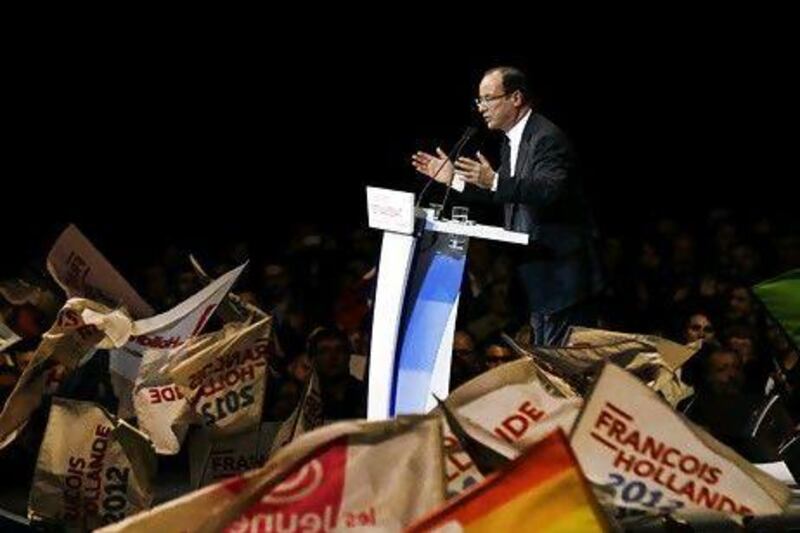MARSEILLE // Supporters of Nicolas Sarkozy say hundreds of French mosques have urged worshippers to defend the dignity of Islam by voting for the socialist challenger François Hollande in the May 6 decider on who governs France for the next five years.
Moderate Muslim leaders have long argued there is no such thing as the "Muslim vote" in France and dispute assertions from the Sarkozy camp that there is an orchestrated move to support Mr Hollande now.
But the current polemic about France and Islam is causing growing concern in Europe's largest Muslim community, mainly with roots in former French colonies in North and sub-Saharan Africa and estimated at between five to seven million.
With his charm offensive aimed at the 18 per cent of first-round electors who put Marine Le Pen, leader of the Front National (FN), in third place, Mr Sarkozy clearly risks driving undecided Muslims with French citizenship into voting for Mr Hollande in the run-off.
Ms Le Pen's demands for an end to both immigration and the "Islamification" of France reflects the outlook of other far-right politicians currently enjoying rising popularity in several European countries. The high level of support she received in last Sunday's first round has handed her a role described by the French media as "referee" or "kingmaker" for the second round.
Mr Sarkozy insists that there will be no ministerial places for Ms Le Pen or FN colleagues in a new government formed by him, and no deal to secure the party's endorsement for May 6. But he has also voiced understanding for the "anger and despair" that, on his assessment, caused a protest vote against him.
Two parliamentarians from Mr Sarkozy's centre-right UMP party, Eric Ciotti and Franck Riester, have said 700 French mosques issued a call to worshippers to vote for Mr Hollande.
Mr Riester said the initiative breached the secularism enshrined in French law. He cited a report in the left-of-centre magazine Marianne, and at www.newsoftunisia.com, a news website read widely by France's Tunisian community, in which a Muslim group was reported to have championed "a massive Halal vote" for the socialist candidate..
Mohamed Salah Hamza, rector of a mosque in the 18th district of Paris, told the magazine this was the best means of "defending our dignity against Islamophobia and the stigmatisation of our community", adding: "Abstention, or voting blank, is haram."
Similar calls were reported in Lyon where, even before the first round, more than 20 mosques were said to have urged Muslims to stop being mere spectators and become participants in the struggle for real change.
At a national level, the organiser of the campaign in favour of Mr Hollande is Abderrahmane Dahmane, who was an adviser to Mr Sarkozy on diversity until leaving in dismay a year ago when the president endorsed his party's controversial decision to hold a conference on Islam in France.
Mr Dahmane has told the French media that despite his past role at the Elysée, he had always maintained contacts with senior French socialists.
Mr Riester said the appeal to Muslim worshippers to vote en masse for Mr Hollande was "serious and unacceptable". Mr Sarkozy also mentioned the issue in a peak-time television interview.
However, France's main Muslim representative body, the French Council of the Muslim Faith (CFCM) says it has seen no trace of any such call beyond encouragement to people to observe a civic duty to vote, without guidance on which candidate they should back.
Mohammed Moussaoui, president of the CFCM, said: "Mosques and religious institutions must observe strict neutrality towards candidates in order to respect the principles of secularism."
This echoed previous statements to the effect that French Muslims reflected the diversity of voters as a whole.
One potential problem for the CFCM approach is that despite its own unqualified condemnation of the Toulouse and Montauban shootings, in which three children were among a young French-Algerian gunman's victims, some sections of French Muslim opinion believes Mr Sarkozy has since indulged in scapegoating.
A nationwide series of raids on the homes of suspected Islamists, carried out in the weeks after the shootings with the clear approval of the president, caused anger and distress when people innocent of any wrongdoing appeared caught up in the operation.
Last week, an Amnesty International report accused France of being among European countries failing to halt discrimination against ethnic groups, especially on jobs and in education.
And the comments of individual Le Pen voters - the very people Mr Sarkozy now wants to help him avoid defeat on May 6 - were hardly reassuring.
"Support for her is explained by the rejection of foreigners," Janine Chaumier, 60, from the southern port of Toulon, told the newspaper Var-Matin. "We're surrounded, there are more and more of them ... I'm not racist but there have been too many abuses."
Mr Sarkozy has also made much of suggestions that Tariq Ramadan, a Swiss academic from Oxford University in England, also advised a Hollande vote. Prof Ramadan, who has repeatedly rejected accusations that he holds extremist and antisemitic views, denies doing so and independent reports indicate he did no more than urge an anti-Sarkozy vote at a time when there were 10 candidates.
Mr Hollande told France-Info radio that Mr Sarkozy had falsely accused him of advocating residency rights for all illegal immigrants currently in France and was now lying about Muslims being told to vote socialist. He narrowly led the field in last Sunday's vote and is favourite to defeat the president a week today.







